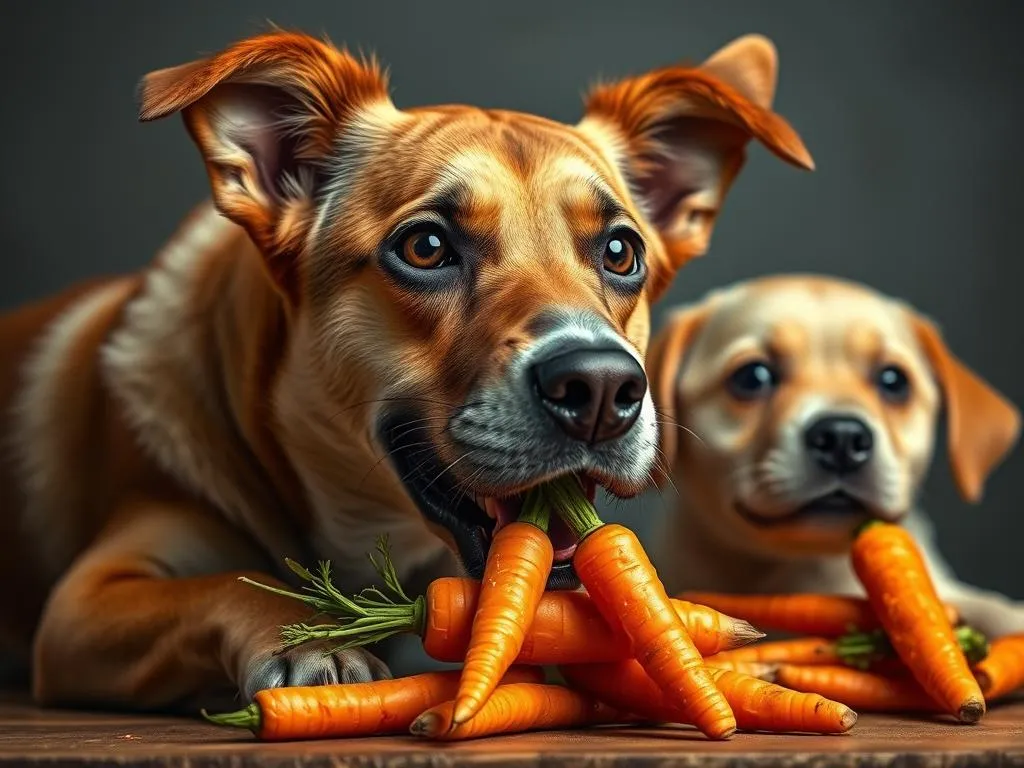
Proper nutrition is essential for maintaining a dog’s health and well-being. Dogs, like humans, require a well-rounded diet that meets their specific needs. Among the various food options available, carrots have gained attention as a potential snack for our furry friends. Understanding the dietary needs of dogs and identifying safe food options are crucial for any pet owner. In this article, we will explore the question: can dogs eat carrots?
Understanding Dog Nutrition
Basics of Dog Nutritional Needs
Dogs require a balanced diet that includes essential nutrients such as proteins, fats, carbohydrates, vitamins, and minerals. Each nutrient serves a specific purpose in maintaining health:
- Proteins are essential for building and repairing tissues.
- Fats provide energy and are vital for healthy skin and coat.
- Carbohydrates serve as an energy source and aid in digestion.
- Vitamins support various bodily functions, including immune health and metabolism.
- Minerals are important for bone health and other physiological processes.
It’s important to note that nutritional requirements can vary depending on a dog’s life stage. Puppies need higher protein levels for growth, while adult dogs require a balanced diet to maintain health. Senior dogs may benefit from joint-supporting nutrients and lower calorie content to prevent obesity.
Common Misconceptions About Dog Diets
There are many myths surrounding dog diets, particularly concerning the suitability of human food. Some people believe that sharing table scraps with dogs is harmless. However, many human foods can be harmful or even toxic to dogs. It’s essential to recognize the importance of specialized dog diets that are formulated to meet their specific nutritional needs, ensuring they receive the right balance of nutrients.
Nutritional Benefits of Carrots for Dogs
Vitamins and Minerals in Carrots
Carrots are more than just a crunchy snack; they are packed with essential vitamins and minerals. Key nutrients found in carrots include:
- Beta-carotene: This antioxidant converts to vitamin A in the body, promoting good vision and a healthy immune system.
- Fiber: Aids in digestion and helps maintain a healthy weight.
- Vitamin C: Supports the immune system and has anti-inflammatory properties.
These nutrients contribute significantly to a dog’s overall health, making carrots a beneficial addition to their diet.
Low-Calorie Snack Option
When it comes to treats, many dog owners are concerned about calorie content. Carrots are a fantastic low-calorie snack compared to other dog treats. A medium-sized carrot has approximately 25 calories, making it an excellent choice for dogs that need to manage their weight. Regularly incorporating carrots into your dog’s diet can support weight management without sacrificing snack time.
Dental Health Benefits
Chewing on crunchy vegetables like carrots can promote dental hygiene. The act of chewing helps scrape away plaque and tartar buildup, which can prevent dental issues. While carrots should not replace regular dental care, they can be a complementary snack that contributes to better oral health.
Can Dogs Eat Carrots?
Raw vs. Cooked Carrots
When considering whether dogs can eat carrots, it’s essential to understand the differences between raw and cooked options.
-
Raw Carrots: Raw carrots are crunchy and retain most of their nutrients. However, they can be difficult for some dogs to chew, especially smaller breeds or those with dental issues.
-
Cooked Carrots: Cooking carrots can make them softer and easier to chew, but it may cause a slight loss of some nutrients. Steaming is recommended as it helps retain more vitamins compared to boiling.
Ultimately, both raw and cooked carrots can be beneficial for dogs. The choice between them depends on your dog’s preferences and chewing ability.
Recommended Serving Sizes
When introducing carrots into your dog’s diet, moderation is key. Here are general guidelines for serving sizes based on a dog’s size:
- Small Dogs (up to 20 lbs): 1-2 baby carrots or a small piece of a larger carrot.
- Medium Dogs (21-50 lbs): 2-3 baby carrots or a larger carrot cut into chunks.
- Large Dogs (51 lbs and up): 3-5 baby carrots or larger carrot pieces.
It’s best to start with small amounts to see how your dog reacts to carrots. Monitor for any signs of digestive upset, and adjust serving sizes accordingly.
Potential Risks and Considerations
While carrots are generally safe for dogs, there are some risks to consider. Whole carrots can pose a choking hazard, especially for smaller dogs. Always cut carrots into manageable pieces to prevent choking. Additionally, overconsumption of carrots may lead to digestive issues, such as diarrhea or gas. It’s important to introduce any new food gradually and observe your dog for any adverse reactions.
Incorporating Carrots into Your Dog’s Diet
Creative Ways to Serve Carrots
There are numerous ways to serve carrots to your dog, making it easy to incorporate this nutritious snack into their diet:
- Raw Sticks: Cut raw carrots into sticks for a crunchy treat.
- Cooked Chunks: Steam or boil carrots, then cut them into small pieces.
- Blended in Food: Puree cooked carrots and mix them with your dog’s regular food for added nutrition.
Combining carrots with other dog-safe foods can enhance the nutritional value of your dog’s meals. For example, mixing carrots with green beans or sweet potatoes can create a healthy, balanced dish.
Homemade Dog Treats with Carrots
Making homemade dog treats is a fun and healthy way to incorporate carrots into your dog’s diet. Here’s a simple recipe for carrot-based dog treats:
Carrot and Peanut Butter Dog Treats
Ingredients:
– 1 cup grated carrots
– 1/2 cup peanut butter (ensure it’s xylitol-free)
– 1/2 cup whole wheat flour
– 1/4 cup rolled oats
– 1 egg
Instructions:
1. Preheat your oven to 350°F (175°C).
2. In a bowl, mix grated carrots, peanut butter, and egg until well combined.
3. Add whole wheat flour and oats, mixing until a dough forms.
4. Roll the dough into small balls and flatten them onto a baking sheet.
5. Bake for 20-25 minutes or until golden brown.
6. Let cool before serving to your dog.
These homemade treats not only offer a nutritious option but also allow you to control the ingredients, ensuring they are safe and healthy.
Other Vegetables Safe for Dogs
List of Dog-Safe Vegetables
While carrots are a fantastic addition to your dog’s diet, there are many other vegetables that can also be beneficial:
- Green Beans: Low in calories and high in fiber.
- Sweet Potatoes: Rich in vitamins and a great source of energy.
- Peas: Packed with vitamins and minerals, and low in fat.
- Pumpkin: Excellent for digestive health and high in fiber.
Incorporating a variety of vegetables can provide a broad spectrum of nutrients, promoting overall health.
Nutritional Comparison
When comparing the nutritional profiles of carrots to other dog-friendly vegetables, it’s clear that each has its benefits. For instance, while carrots are high in beta-carotene, sweet potatoes are rich in vitamins A and C. Green beans and peas provide fiber and protein, making them excellent complementary options. Offering a mix of these vegetables can contribute to a well-rounded diet.
Conclusion
In summary, carrots can be a nutritious and safe snack for dogs when fed in moderation. They provide essential vitamins and minerals, serve as a low-calorie treat, and promote dental health. However, it’s crucial to introduce any new food gradually and monitor your dog for any adverse reactions. Remember that variety is key in a dog’s diet. Consulting with a veterinarian can help ensure that your dog’s dietary needs are met and that they are receiving a balanced and healthy diet.
FAQs
Can dogs eat carrot tops?
Yes, dogs can eat carrot tops, but moderation is important. While they are safe, they may not be as palatable for dogs as the root itself. Always wash them thoroughly and chop them into small pieces before serving.
Are there any dogs that shouldn’t eat carrots?
Some dogs may have allergies or specific medical conditions that restrict carrot consumption. If your dog has a history of food allergies or digestive issues, consult your veterinarian before introducing carrots into their diet.
How often can I give my dog carrots?
Carrots can be offered as an occasional treat or mixed into meals a few times a week. It’s essential to balance treats with their regular diet to maintain overall nutrition.
With the right approach, carrots can be a delightful and nutritious addition to your dog’s diet, contributing to their health and happiness.









